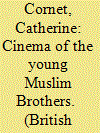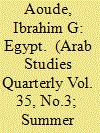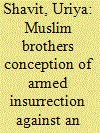| Srl | Item |
| 1 |
ID:
178543


|
|
|
|
|
| Summary/Abstract |
This article examines Islamist engagement with popular culture in Egypt, focusing on Ikhwān Cinema a cultural intervention launched by a youth group affiliated with the Muslim Brotherhood, following the election of Mohamed Morsi as president in June 2012. Until now, scholars have tended to ignore Islamist-produced popular culture, reflecting assumptions that Islamists are opposed to popular culture, and even culture more broadly. Yet, as this article explores, the Muslim Brotherhood has historically viewed culture as an important vehicle through which to disseminate their ideas and to attract people to the organization. The first part of the article reviews the historical position of the Muslim Brotherhood towards the arts and cinema in order to put Ikhwān Cinema into context. The second part examines the aesthetic content of Ikhwān Cinema’s video productions, specifically created for social media consumption. The third part analyses how the group continued these aesthetics following the toppling of their political leader in July 2013. Overall, the article argues that we can understand Ikhwān Cinema both as a continuation of the Muslim Brotherhood’s historical engagement with culture as well as a case of a post-Islamist trend that seeks to blend Islam with elements of global youth culture.
|
|
|
|
|
|
|
|
|
|
|
|
|
|
|
|
| 2 |
ID:
124602


|
|
|
|
|
| Publication |
2013.
|
| Summary/Abstract |
The upheaval that has swept the Arab world, beginning in December 2010, reached Egypt on January 25, 2011. The article argues that capitalist globalization and ultimately the 2008 global financial crisis were main causes of the uprising. The Mubarak regime's privatization schemes exacerbated poverty and widened the already huge gap between rich and poor. Mubarak employed repression to ensure that no effective political opposition would materialize to challenge his authoritarian rule and crony capitalism. Strikes and demonstrations beginning in 2006 and the lead up to the uprising demonstrated that the fight for democracy and economic justice had been intertwined. The ouster of Mubarak has not improved the economic situation for the majority of the population and authoritarian rule remained under the military and since the election of the Islamist President Morsi. Popular resistance continues against the Islamists in power to bring about a secular regime that would establish democracy and economic justice.
|
|
|
|
|
|
|
|
|
|
|
|
|
|
|
|
| 3 |
ID:
139310


|
|
|
|
|
| Summary/Abstract |
The article analyzes the opinions of the intellectual and political luminaries of the Muslim Brothers from the 1930s to the late 1990s on launching an armed insurrection against an unjust Muslim regime. An examination of works by Hasan al-Banna, Hasan al-Hudaybi, ‘Umar al-Tilmisani, Muhammad Qutb, Yusuf al-Qaradawi and Ma'mun al-Hudaybi reveals that, in addressing different types of challenges, the mainstream of the movement developed a broad and consistent consensus on the matter that draws from classic Islamic jurisprudence. According to this consensus, violence can be applied only as a last resort and only following an application of ‘fiqh al-muwazanat’ (the jurisprudence of balances) that indicates that success is certain, and that the harm caused in the process would not be greater than the benefit incurred. How a specific regime came to power, and the level of injustice it commits, are irrelevant criteria; a decision on launching a violent revolution is primarily concerned with pragmatically assessing opportunities and consequences.
|
|
|
|
|
|
|
|
|
|
|
|
|
|
|
|